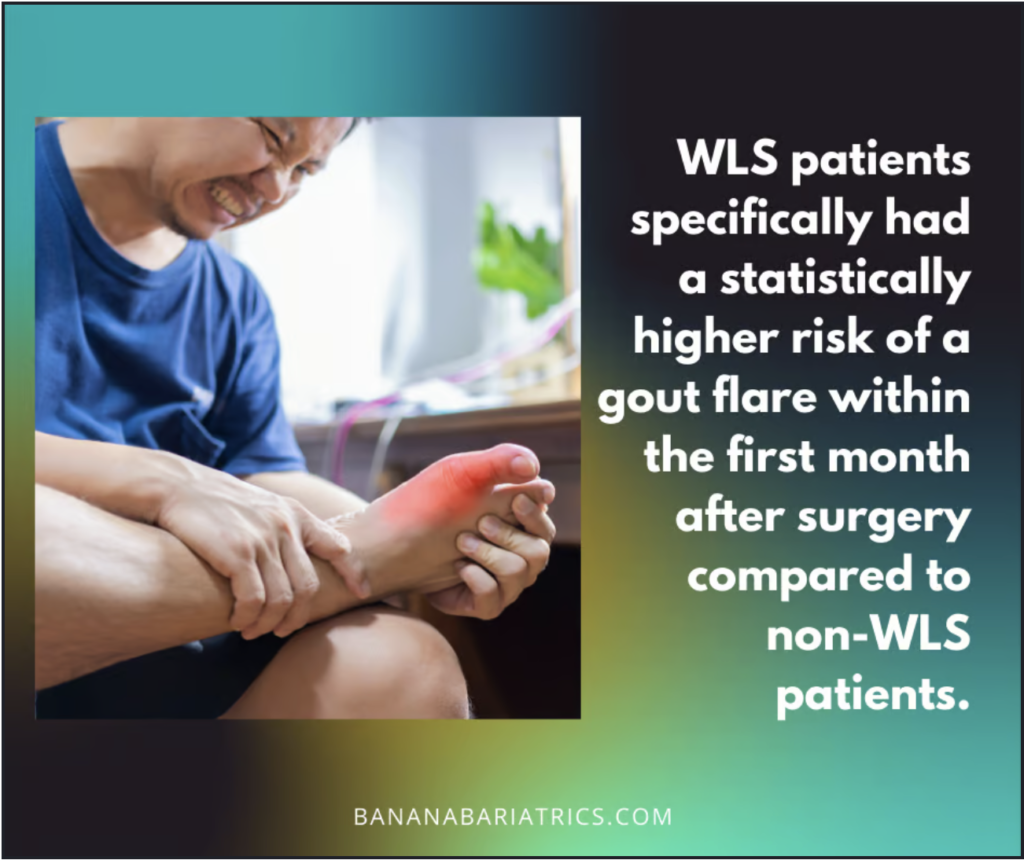Having Weight Loss Surgery Can Increase Your Risk Of Gout Attacks After Surgery

The other day in clinic, one of my patient’s had to reschedule their appointment due to being in the hospital for an acute flare of gout in his foot. He reported a warm, hot, and swollen top to his foot when I was reviewing his symptoms on a Telehealth visit in follow-up.
Admittedly, I didn’t know a whole lot about gout at that time. What I DID know…was that gout was characterized by monosodium urate crystal that become deposited into the joint spaces causing significant impairment in a person’s physical activity and quality of life. Aside from that, I didn’t know much on what could instigate a flare in a bariatric patient right after surgery.
Intrigued, I dove into the literature to find out. I wanted to know what I could do as a PA to educate and potentially prevent these attacks from occurring in my higher risk patients post-operatively.
I found a retrospective journal article titled; “The effect of bariatric surgery on gout: a comparative study” that educated me on some of the answers I was seeking.
One of the biggest risk factors to the development of gout is obesity. Obesity is defined as having a body mass index (BMI) greater than 30. Obesity is a known source of full-body inflammation. In addition to this, other co-morbidities such as diabetes, high cholesterol, and high blood pressure (aka- “metabolic syndrome) can all contribute to gout and acute flares.
The retrospective study I was reading compared weight loss surgery (WLS) patients to other patients undergoing non-bariatric general surgery procedures. Surgery itself can stir up inflammation in the body during recovery. The authors were intrigued by the fact that WLS patients specifically had a statistically higher risk of a gout flare within the first month after surgery compared to non-WLS patients.
The current medical literature is lacking research that explains why bariatric patients have higher rates of gout flares within the first month after surgery. However, the authors of the study proposed a few findings and suggestions that could potentially explain the increased occurrence. Some of their ideas included:
- Portion-controlled protein-rich diets before and after surgery. This can contribute to high levels of uric acid in the blood which can precipitate as crystals in soft tissues and joints, contributing to gout
- Purine rich foods including meat, fish, and protein supplements
- Low calorie intake after surgery
- Dehydration
Thirteen months after surgery, there was a significant reduction in the blood concentration of uric acid levels in bariatric patients. Coupled with an improvement in insulin resistance, kidney function, and full-body inflammation, WLS patients were less like to have gouty attacks further out from surgery.

Bibliography
Romero-Talamás, Héctor, et al. “The Effect of Bariatric Surgery on Gout: A Comparative Study.” Surgery for Obesity and Related Diseases, vol. 10, no. 6, 2014, pp. 1161–1165., https://doi.org/10.1016/j.soard.2014.02.025.
Interested in more bariatric specific content? Inside our exclusive membership support group Banana Bariatrics, you’ll have access to a library vault of resources and weight loss surgery specific educational courses. Curious of what’s inside? Learn more below!
Share with others:
JOIN OUR COMMUNITY:


Responses